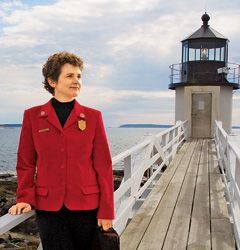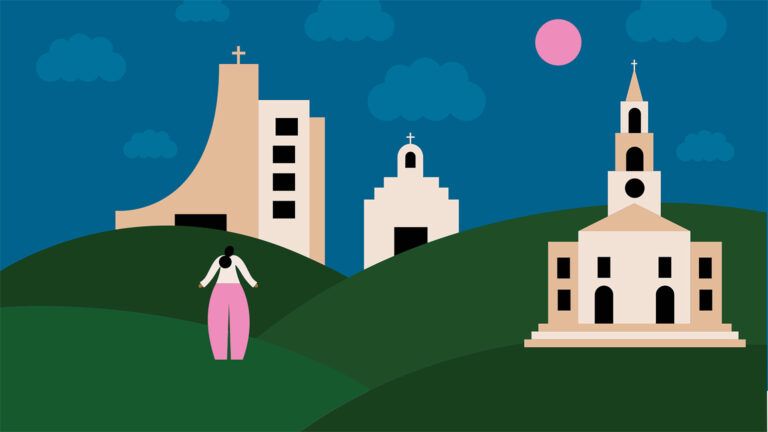The parents of the missing girl sit with me on a picnic table.
It’s after 10:00 p.m., 11 hours since their daughter wandered off from their campsite. State game wardens comb the surrounding woods and marsh, but they’ve searched for most of the day with no sign of the six-year-old girl in the Elmo sweatshirt.
This is my job, as the Maine Warden Service chaplain, to support the family…and wait…and worry. “Why wouldn’t she hear us calling and answer?” the father asks.
“She’s probably asleep,” I say, trying to project confidence. “Little kids who get lost in the woods find a snug place, curl up and go to sleep.”
The parents look at my clerical collar and my uniform. They trust me. Oh, please, God, let this be true. Let their daughter be alive. I think about my four children at home, safe in their own beds. And I think of my late husband, Drew.
Sometimes it’s hard to believe it’s me, and not Drew, offering words of comfort to families and game wardens in crisis. Drew, a police officer, was going to be a minister after he retired from the force. He was the one with the calling, the knowledge of Scripture, the faith that God was always there. I was the writer, the intellectual, the sometimes skeptic—opposite from him in so many ways.
My mind flashed back to that day, more than two years ago, when Drew, and the dreams we shared, died without warning. I was filling up the car at the Pik Qwik when I heard about an accident on the radio: a truck and a state police car. I hurried to the fire station next door for information. The dispatcher, ashen, asked me to wait in the kitchen while he made a call.
Then there was Peter, a neighbor and Episcopal priest, flying through the door. He was crying. What seems strange now is that I can’t recall a word he said, only his clerical collar and the fact that when I needed someone he was there.
“If only I knew for sure,” the mother of the missing girl says. Her eyes scan the darkness, pleading for a sign.
“It’s miserable to wait,” I say. She nods, eyes scanning, her mouth taut.
I remember that sense of hopelessness, of having the life I knew ripped away. I didn’t know what I was doing, who I was, where to turn. God seemed unreachable. I didn’t know how to talk to him. That was Drew’s area, not mine. It felt as if I were watching someone else on a stage, a weeping, tragic figure trapped in a play with no ending.
One morning, maybe a year after Drew’s death, I stood at the kitchen sink, staring blankly out the window. Everything reminded me of Drew and our 10 years of marriage. The kids’ faces. The living room couch where we’d sit and talk after our children had gone to bed. We got into some heated discussions—Drew’s passion and faith versus my rationality and reason. His favorite meal, chicken stew, which I tried to make the way he had. Drew was the cook. Not me.
In the distance I heard the sound of a state police cruiser coming up the road. For a second, my mind told me it was Drew. My heart leaped. I almost called out to the kids: “Daddy’s home!” Then the sound receded and I remembered.
Everything seemed that way without Drew, incomplete, disconnected. I knew I had to find something to do. I wasn’t worried about money. That was the point of Drew’s life insurance—financial peace of mind. But there was no clause for how to escape grief.
I was a writer—in theory. In reality, it had been six years since I’d published my novel. Besides, writing meant months of introspective work at my computer. That was the last thing I needed. In my mind, everything led back to Drew. We’d worked hard to meld our dreams. I couldn’t imagine living any other life than the one we’d planned.
There was a knock on the door. My friend Monica, with her three kids in tow. Her children and mine made a beeline for the back door and I brought our coffees to the kitchen table. Monica and I raised our kids together, shared our lives. “How’s your day been?” she asked.
“You know,” I said, shrugging. “About the same. Cry. Make lunch. Cry some more. I’ve got to get out of this house, find a job, do something. But I don’t even know where to start. With the kids, I haven’t worked anywhere in years.”
“It’s hard,” Monica said. “But you’ve got to give yourself time.”
“I keep thinking Drew would have the answer,” I said. “He always knew where he was going. Fifteen years from retirement and he had it all figured out. He was going into the ministry, wanted to pastor a church, be a police chaplain.”
I remembered how he talked about it being an extension of his work as an officer and the emotional pain he saw in his job. That was Drew, always looking for some way to serve. Why couldn’t I be more like him?
“I had no idea,” Monica said. She leaned across the table, eyes wide. “How come you never told me that?”
“Drew and I talked about it all the time,” I said. “That was our dream. The kids would be grown. I’d be writing again. But what I really saw myself doing was being there for him. He was going to need so much support. I wanted to do that for him…”
“Kate, that’s so beautiful,” Monica said, but she looked like she was puzzling over something. “Why couldn’t you be a police chaplain?” she said. “You’re so loving and caring. You were married to a police officer, so you know what they and their families go through.”
“No, that was Drew’s dream,” I said.
The kids tramped into the house. Was there any part of them that wasn’t dirty? “We’ve got to go,” Monica said. “But think about what I said.”
I didn’t want to, but that night, after I’d gotten the kids to bed, I couldn’t get the conversation out of my head. It bugged me. It was so illogical. It reminded me of Drew, how he’d stubbornly cling to some indefensible point. It was like he was in the room with me.
There’s just no way, I argued. I didn’t have Drew’s rock solid faith. What great biblical insights did I have to share? None. That’s what. How could I be of comfort to anyone? I couldn’t even get past my own grief.
So? I heard Drew say in my mind. You’re not me. Why can’t you just be yourself? What kind of argument was that? He could be so annoying. Then I realized, for the first time in months, I was smiling.
I needed someone I could reason with, someone intellectual. I thought of my neighbor the Episcopal priest, Father Peter. Ever since Drew died, he had checked in on me, more like a friend than a spiritual advisor. He knew what I was going through. He’d see my point. I went to see him the next day.
“I’ve had this crazy thought,” I told him, “of going into the ministry, maybe as a police chaplain. Mostly I’ve been thinking of all the reasons it’s a bad idea. I need to hear it from someone else so I can move on.”
He looked at me thoughtfully. “You’d be perfect,” he said. “I don’t know why it didn’t occur to me before now.”
“No,” I said, my voice rising in frustration. “You’re thinking of Drew. I’m not like him. I get tongue-tied when I pray. People will have questions I won’t know the answers to. It seems wrong.”
“Actually, that’s a good sign,” Father Peter said. “I hear the passion in your voice and your doubts and I see God at work. It’s often the people who feel least qualified…that’s who he calls.”
“But-but,” I stammered, “I don’t know the words to say to people. I don’t know the Bible like Drew did.”
“When the time comes, you’ll be ready. God will be there with you,” he said. “But you’re overthinking this. You’ll find that what people need most is just to feel God’s presence through you. All you need to do is care.”
I looked at Father Peter’s white collar and remembered that moment he’d rushed into the fire station. Then, in his office, there was the most intense feeling of comfort—like God had set aside everything else on his cosmic plate and was focused only on me. I thought of Drew and the love we had for each other, the love I still had inside of me. And I knew what God was asking me to do.
Three months later I entered seminary. I found a community of fellow travelers, eager to practice their pastoral skills should I begin weeping during a discussion on predestination or Hebrew phonemes. But I also discovered they had questions, fears and insecurities like I had.
Each day I felt the grief lifting, my mind stimulated by the intellectual rigor of researching, debating and writing about words and truths passed down thousands of years ago, lessons that live on today. It was what I’d been searching for—the healing I needed. And when I graduated and learned that the state’s Game Warden department was looking for its first chaplain, I eagerly applied for the job.
That’s why at 3:00 a.m. I’m still here with the parents of the lost child…waiting. For a moment it seems I’m dreaming when out of the woods walks a game warden, hand in hand with a little girl in an Elmo sweatshirt, a search-and-rescue dog trotting proudly ahead of them. “We found her sleeping under some brush,” he says. “She’s a brave little girl, but I think she’s ready to go home.”
The mother turns to me and quickly mouths, “Thank you.” Then she and her husband run to their daughter, their arms wrap tightly around her. “It’s a miracle,” the mother cries.
It’s been a long night, full of fear, doubt and uncertainty. But God, of course, has been with us in the darkness. And now here is the best part of my job, bearing witness to rejoicing and the gladness of the coming day. Amen, I think. Amen.
Read an excerpt from Kate’s new book, Marriage and Other Acts of Charity!




